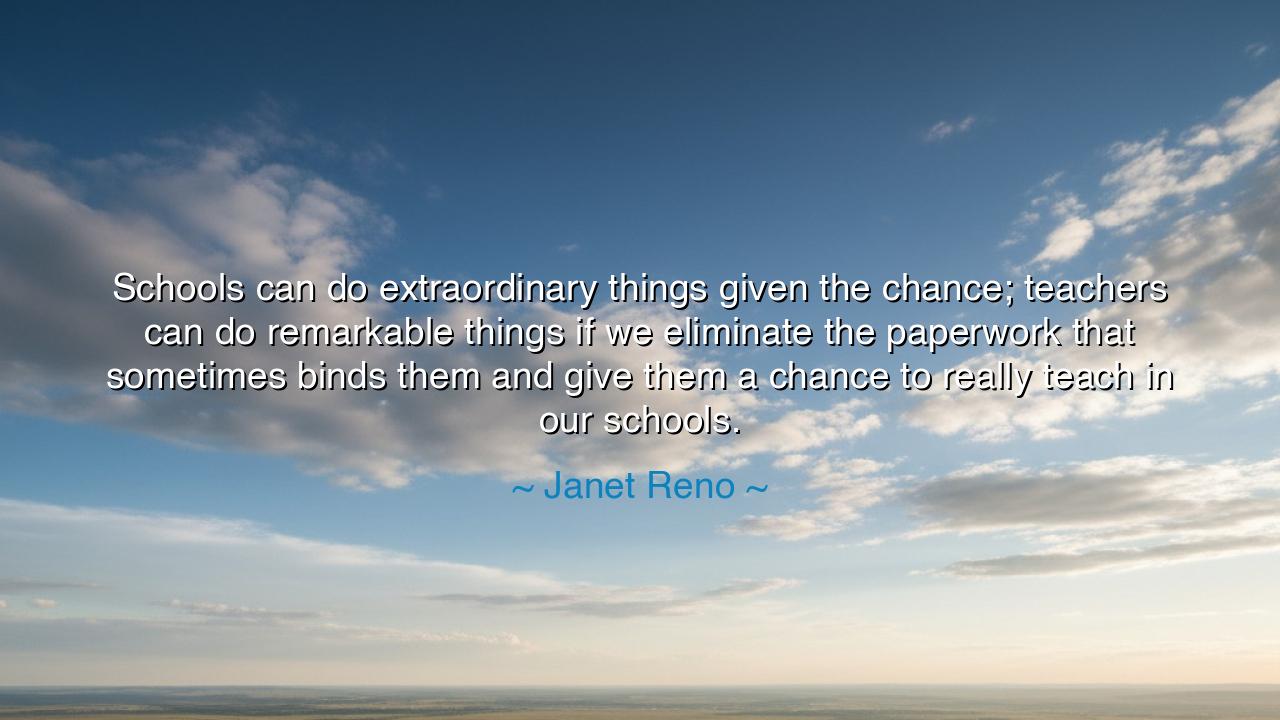
Schools can do extraordinary things given the chance; teachers
Schools can do extraordinary things given the chance; teachers can do remarkable things if we eliminate the paperwork that sometimes binds them and give them a chance to really teach in our schools.






In the heart of every thriving society lies the school, the hallowed space where the minds of the future are forged. The words of Janet Reno, “Schools can do extraordinary things given the chance; teachers can do remarkable things if we eliminate the paperwork that sometimes binds them and give them a chance to really teach in our schools,” speak to the immense potential that lies within the educational system — a potential often stifled by the very systems designed to support it. Reno's reflection is a call to recognize the transformative power of education and teaching, and the profound impact that can be achieved when we remove the obstacles that prevent those in positions of influence from fully realizing their roles.
The essence of Reno’s words is grounded in the belief that teachers are not mere transmitters of facts, but guides who inspire, shape, and nurture the minds of the next generation. When teachers are burdened by endless paperwork, administrative tasks, and bureaucracy, they are denied the opportunity to engage fully with their students, to challenge them, to awaken their curiosity, and to foster a love of learning. This stifling of their creative power and dedication diminishes the potential that schools have to shape individuals into critical thinkers, innovative creators, and compassionate citizens. In essence, Reno calls for a revolution within the education system, where teachers are given the freedom to teach, to truly teach, and to empower their students without the chains of unnecessary regulation.
In ancient Greece, the great Socrates was not bound by the rigid structures of formal schooling; he wandered the streets of Athens, engaging with the youth in philosophical debate, asking the questions that challenged their understanding of the world. His method, known as the Socratic Method, was not about memorizing information, but about critical thinking, dialogue, and the pursuit of truth. Socrates taught by questioning, by provoking thought, and by encouraging his students to think for themselves. He had no paperwork to complete, no administrative duties to fulfill; his only duty was to guide his students toward intellectual independence. His success, and the influence he had on the minds of future generations, was a result of his freedom to teach in the purest sense, unencumbered by the bureaucracy of the time.
Similarly, the story of Maria Montessori, the famed educator whose methods revolutionized the way we think about child development and education, demonstrates the incredible power of freedom in teaching. Montessori believed that the classroom should be a space of discovery, where children are free to explore at their own pace and engage with learning on their terms. Her approach focused on independence, creativity, and self-motivation, allowing students to take control of their own learning. Montessori’s method was not about standardized tests or rigid curricula, but about giving both teachers and students the freedom to explore the world of knowledge in a way that was meaningful and profound. The success of her approach highlights the extraordinary results that can emerge when we remove the constraints and allow educators to teach in ways that foster true engagement.
But Reno’s quote does not only speak to the past; it has profound relevance for our times. In the modern world, the education system is often weighed down by mountains of paperwork, standardized testing, and a focus on administrative efficiency that can leave teachers struggling to connect with their students on a deeper level. The bureaucracy of education can rob the profession of its nobility and its purpose. We see this in the stories of dedicated teachers, like Anne Sullivan, who overcame personal challenges to become the teacher of the legendary Helen Keller. Sullivan’s success was not because of strict curriculums or the support of a bureaucratic system, but because she was given the freedom to teach Keller in a way that recognized her unique potential. The true greatness of her teaching was in her ability to adapt, to nurture, and to connect with her student in ways that went beyond the traditional methods of her time.
The lesson that Janet Reno imparts to us is that education should never be about compliance to rigid structures, but about fostering the human connection that enables teachers to nurture the minds and hearts of students. Teaching is a deeply personal endeavor, and when teachers are restricted by bureaucracy, they cannot fully engage with their students. The chance to teach, in its truest sense, requires the freedom to inspire, to create, and to challenge. It is in these moments of freedom that teachers can truly make a difference, guiding their students toward knowledge, wisdom, and understanding.
Therefore, let us recognize that the power of a teacher lies not in the standardization of education, but in the individuality of each student and the creative potential of each educator. We must remove the obstacles that hinder the freedom to teach and allow schools to fulfill their true purpose: to empower the next generation. Like the great thinkers of old, let us create spaces where learning is engaged, dynamic, and life-changing. Teachers, when given the proper resources, trust, and freedom, have the power to change the world, one student at a time. And in doing so, they create not just knowledgeable individuals, but thoughtful, compassionate citizens who will carry the light of learning into the future.






AAdministratorAdministrator
Welcome, honored guests. Please leave a comment, we will respond soon